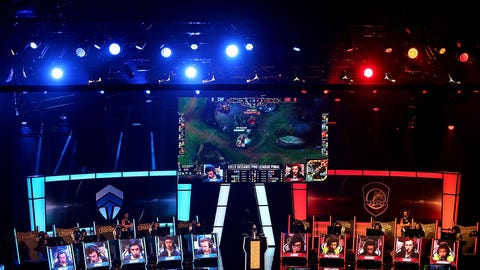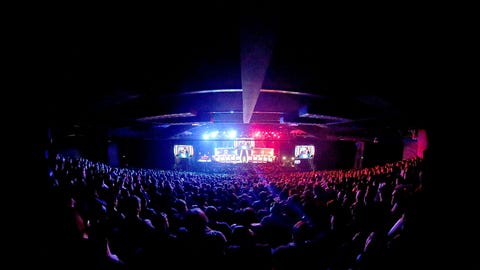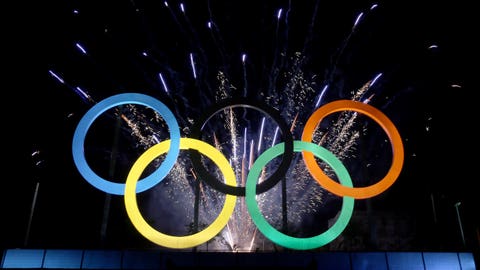Competitive video gaming, known as eSports, will become a medal event at the 2022 Asian Games, a landmark decision that begins the very-long process of paving the way for the activity’s inclusion in the Olympics. Because the IOC acknowledges the Asian Games – which is like the Olympics on a continental scale – eSports will become a recognized Olympic sport when the first headsets are put on five years from now in Hangzhou, China.
Does that mean video games coming to the Olympics?
First, a clarification: Becoming an “official Olympic sport” does not equal “will be competed at the Olympics.” It merely means that the IOC has recognized the governing body of said sport, the same way it has to cheerleading, bowling, polo, racquetball, orienteering, tug-of-war and dozens of other competitive endeavors that aren’t in the Olympics. Actually getting to the Games is a years-long, multi-step process that, it’s assumed, eSports will be exploring. If common sense wins out, it’ll be a short journey.

eSports are neither a sport nor an activity that vaguely resembles a sport (e.g. diving, rhythmic gymnastics, synchronized swimming). They have no business in the Olympics, even with the IOC focused on youth – hence the X-Gamesification of the Winter Olympics and the addition of skateboarding, surfing and climbing to the programme. If the discipline is ever added to the Olympics, it’ll be a dark day for the Games not seen since that time Ryan Lochte went clubbing.
It’s an impressive effort to call playing video games “eSports.” It’s like a shot-in-the-dark hope that saying it enough will convince people it’s actually a sport. But, no. Wrap it up however you want, moving a joystick simply has no athleticism, sport or exertion that makes something a sport. Competitive eating sounds good too but at the end of the day it’s just people stuffing their faces with hot dogs.
This isn’t an insult to gamers nor does it besmirch the activity at which they excel. It takes dexterity, intelligence, reflexes and coolness under pressure to succeed in gaming. The image of the couch potato sitting on a ’70s-era couch and playing some Final Fantasy while drinking Mountain Dew from a two-liter bottle is a crude caricature. The eSports guys (and they are almost exclusively guys) look like college kids banging out their thesis at the library. They’re legit competitors who happen to wield a joystick. How’s that so different than a pole vault or bow-and-arrow?

The eSports crowd would say it isn’t (and that their game is a lot more popular). There are plenty of Olympic sports that aren’t physically taxing and require skill, precision and mental strength. (Archery, shooting, curling and diving come immediately to mind.) That, combined with the fact that there’s an untapped market waiting for the Olympics, makes eSports a no-brainer.
There’s no quibbling with the last point. At least 43 million people watched some part the 2016 League of Legends World Championship with 15 million watching at its peak during the final match. Spectators have sold out arenas throughout Asia and on the American coasts – at Madison Square Garden and Staples Center. Top earners can make as much as $2 million and 100 gamers have made more than $450,000 in prize money. This is a real business. And that, ultimately, is why eSports might get into the Games sometime down the road. (The key words there being “might” and “down the road.”)
Where there’s interest, there’s crowds. Where there’s crowds, there’s money. Where there’s money, there’s advertisers. How did eSports get into the Asian Games? There was a push from Alibaba, the Chinese online behemoth (think Amazon). They’re not doing it for charity. There’s money in eSports and what color does the IOC love more than gold? Green. When you strip it down, isn’t capitalism the most Olympic of sports?

Either way, eSports are the real deal. But popularity and difficulty only go so far. Monster Jam and wrestling are popular but no one’s clamoring for the Devastator or Undertaker to win medals. Becoming a prima ballerina is so difficult it’s virtually impossible – as a sporting endeavor it’s far harder than qualifying for the Olympics in any sport. Should dancing to Swan Lake be an Olympic sport? No. These activities know to stay in their own lanes.
There’s a logistical problem too, one that threatens eSports as an Olympic event far more than narrow-minded traditionalists like myself. The games played in various eSports competitions don’t have definitive lifespan. League of Legends (the game that sold out the Garden) is the most popular but was made in 2009, about the same time Apple released the iPhone 3GS, which added video, a 3-megapixel camera and a cut/copy/paste function. LoL will still probably be around in five years (especially with no sequel in sight) and probably even seven (when the 2024 Games could be in Los Angeles, which has shown support for eGames before). But what about the 2028 Olympics and beyond? By that time, League of Legends will be as old as Super Mario Bros. 3 was when League of Legends came out. The IOC isn’t going for a moving target and even if eSports was a stationary one, past precedent says it’s not happening.
“Mind sports, by their nature, cannot be part of the program,” IOC spokeswoman Emmanuelle Moreau told TIME Magazine in 2008.
That was from an article about other hard-to-master, popular activities recognized as “sports” by the IOC. And last I checked, there aren’t any gold medals being given out for chess or bridge.



